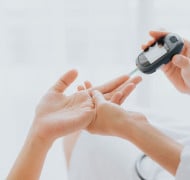Ovarian Cysts and Fertility
Posted on September 30th, 2022

Whether you know it or not, you have probably had a cyst at some point in your life. Cysts are small, sac-like growths that are filled with fluid or semi-solid substances. They can develop on any part of the body and are usually benign. Many women develop cysts in their ovaries that are often harmless and painless. In many cases, you might not even realize that you have them. But can these cysts hurt your fertility?
The answer is usually not. Most of the cysts you develop on your ovaries are “functional,” meaning they are part of your menstrual cycle and will go away on their own. These cysts often indicate that the necessary functions that lead to fertility are happening. However, there are some types of cysts associated with reproductive syndromes that can potentially lead to fertility issues.
Polycystic Ovary Syndrome (PCOS)
Polycystic ovary syndrome (PCOS) is a chronic hormonal condition affecting 20% of people of reproductive age. Those who have PCOS experience multiple painful cysts on their ovaries. This causes irregular menstruation cycles as well as various symptoms, ranging from painful menstrual cramps and weight gain to infertility. This condition can also increase your chances of pregnancy and fertility complications. Women with PCOS have a higher chance of the following during pregnancy:
- Miscarriages
- Gestational diabetes
- Preeclampsia
Endometriomas
During ovulation and menstruation, the endometrium (i.e. the tissue that lines the uterine wall) develops inside the uterus, thickens, breaks down, and bleeds out of the body each month. In endometriosis, which is when this tissue grows outside the uterus, it performs the same functions, but it has no way to exit the body. Consequently, cysts on the ovaries called endometriomas and scar tissue can develop. This causes adhesions (i.e. when bands of scar tissue form between tissues and organs) as well as irritation in the pelvic area. Not only can this be very painful, but it can also make it difficult to conceive. Endometriomas can also affect your ovarian reserve both in terms of egg quality and quantity. When egg quality and quantity are compromised, it may be difficult to conceive, even in good health.
When to See Your Provider or a Fertility Specialist
Unless you suffer from PCOS or endometriosis, it is unlikely that an ovarian cyst will interfere with trying to become pregnant. However, if you’re experiencing painful or severely uncomfortable menstrual symptoms, it’s best to check in with your provider or gynecologist. These symptoms can include cramps that are getting worse, irregular periods, and pelvic pain. These can all be signs of an issue with your reproductive system. In some cases, seeing a fertility specialist may be recommended.
For questions about fertility health, or if you are trying to conceive, contact Aspire Fertility today.

























